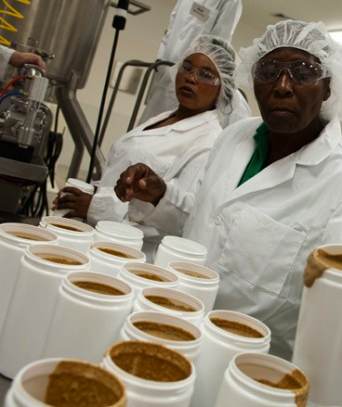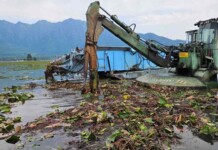 A crew of Haitian workers clad in white lab coats, rubber-soled boots, safety goggles, and hair nets pass through a corridor and into a sterile production area that’s lined with hulking stainless steel devices, one of which looks like a giant KitchenAid Mixer. At 8:30 a.m., the machinery starts whirring and roaring. Before long, the distinct aroma of crushed peanuts hangs in the air.
A crew of Haitian workers clad in white lab coats, rubber-soled boots, safety goggles, and hair nets pass through a corridor and into a sterile production area that’s lined with hulking stainless steel devices, one of which looks like a giant KitchenAid Mixer. At 8:30 a.m., the machinery starts whirring and roaring. Before long, the distinct aroma of crushed peanuts hangs in the air.
From the outside, the two-story white building looks like a standard warehouse you’d see on the outskirts of any American city. But located in Haiti’s Central Plateau, the Nourimanba Production Facility is a state-of-the art operation that’s helping tackle one of the country’s most pressing challenges—malnutrition. It also uses only locally grown peanuts, making it a reliable market for local farmers to sell their yields.
In Haiti, malnutrition is the leading cause of death among children 5 years old and younger. And it’s not just children who are affected—pregnant women and teenagers also experience the disastrous consequences of poor nutrition.
Within a few months of officially opening this year, the facility has already created more than two dozen jobs and churned out more than 6,000 kilograms of the lifesaving treatment.
“This center will have a major impact on the community—a lot of people are working here, and new industries help develop communities,” says Myrlene Arthus, production supervisor at the facility. “I love what I do because I am working for children that are sick. The product I make is helping save children’s lives.”
RELATED: June 2013: New hospital in Haiti, fully powered by solar energy, solves the problem of how to provide modern health care amid intermittent power shortages. (Tags – Partners In Health, Haiti)



















